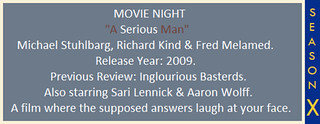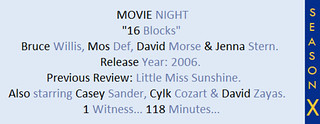
Review #1553: Fantastic Mr. Fox.
Cast:
George Clooney (Mr. Fox), Meryl Streep (Felicity Fox), Jason Schwartzman (Ash Fox), Bill Murray (Clive Badger), Willem Dafoe (Rat), Michael Gambon (Franklin Bean), Owen Wilson (Coach Skip), Wallace Wolodarsky (Kylie), Eric Anderson (Kristofferson Silverfox), Jarvis Cocker (Petey), Wes Anderson (Stan Weasel), Robin Hurlstone (Walter Boggis), and Hugo Guinness (Nathan Bunce) Directed by Wes Anderson.
Review:
"I like to do things that are a little surrealistic but with characters who are real. So that, even if things are a little unusual, the emotions will come through anyway.”
The auteur filmmaker is one that knows and controls his style to create a distinct film of his own merit. Wes Anderson certainly has proven himself worthy of the label alongside a variety of others with his level of filmmaking. The native Texan made films from a young age - making his first films with a Super-8 camera. He liked films such as Star Wars and directors like Alfred Hitchcock, even working as a projectionist when studying philosophy at the University of Texas at Austin. In 1992, he directed a short film with friend Owen Wilson called Bottle Rocket (which he wrote with Wilson that was inspired by films like Mean Streets). A submission to the Sundance Film Festival (which James L. Brooks, upon viewing it was "dazzled" by) resulted in an opportunity to direct a feature film based on the short (with time spent re-working the script and filming) - released in 1996, it received notice but was not an audience hit. His next film in Rushmore (1998) proved more successful; after these two films, he already had one significant fan in Martin Scorsese (who called both films "very funny, but also very moving"). His subsequent films have received a good deal of notice that have made for nine released features in nearly 25 films of filmmaking. Anderson is noted for his distinct style of films, which he described as "very personal movies in a way", built with quirks in his characters and with the choices of music and look of each film, while also featuring a variety of recurring actors (such as Schwartzman, Murray, Dafoe, Wolodarsky, and Wilson). For this film (which he co-wrote with Noah Baumbach along with serving as co-producer), it would be done in stop-motion animation with figurines that were made out of fur (with tailored clothing of fabric that he designed himself).
Sometimes a film can be just a bit more than just a fine adaptation of another work. This was based off the 1970 children's novel of the same name by Roald Dahl (who many will recognize as writer of works such as Charlie and the Chocolate Factory, Matilda, and The BFG, each of which I read as a child) - it was apparently the first book Anderson remembers owning. The film is mostly faithful to the novel, aside from having a focus on the relation of Mr. Fox to his family (which cut the four children to one) that expands upon the narrative (in other words, more than just a fox stealing chickens from a bunch of weirdos), in addition to a tweaking of the ending and a few added scenes. Sure, one could have the voices done in the booth, or they could have them done at a farmhouse as is the case here with such a marvelous film like this proves to be. It never wavers from delivering an interesting story with plenty of whimsy and skill with performances to go along with entertaining voices and design that make a wonderful classic worth 88 minutes. It all falls first to Clooney, who does quite well in brimming confidence that weaves interest and curiosity that generate subtle amusement fitting for that particular timing and character. Streep goes along with reserved grace that makes a well-tuned chemistry with Clooney in their scenes shared together. Schwartzman does well in generating interesting angst and smart remarks for when it is necessary that drives the film in those careful moments handled with his counterpart in E. Anderson (illustrator and author, who had made cameo appearances in his brother's films). Murray makes a few funny moments count without needing to hear too much of him badger on, while Dafoe equally makes his dandy moments count well in amusement. The film hits its stride early and never lets go in examining the nature of longing, alienation, and ultimately togetherness within a worthwhile adventure. I am dazzled by the animation of the film, as it looks quite intricate and rightly executed in creating a world of dazzling charm and palate (with a distinct lack of blues or greens) that never looks excessively gaudy or too much for enjoyment. I like the entertainment it brought to a charming work that honors the original book with its own flourish of humor and narrative for a resplendent achievement for animation alongside its era and director.
Overall, I give it 10 out of 10 stars.















